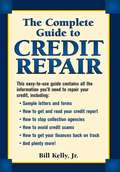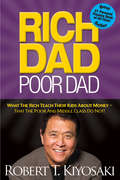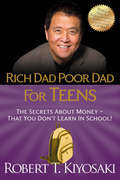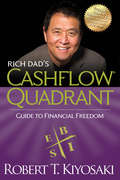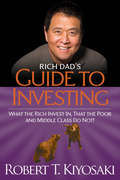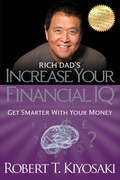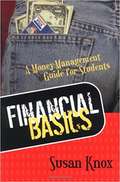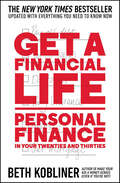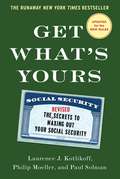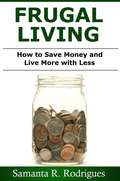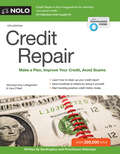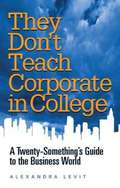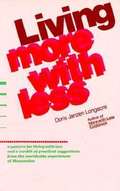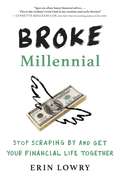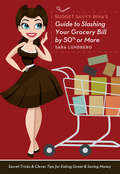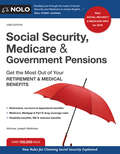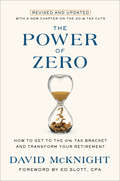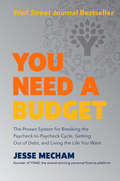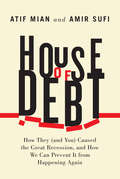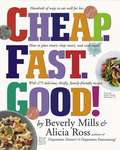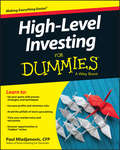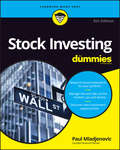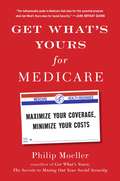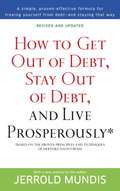Special Collections
Focus on Finance
- Table View
- List View
The Complete Guide to Credit Repair
by Bill KellyWith more and more people declaring bankruptcy and total debt in this country rising, the time is perfect for a book like The Complete Guide to Credit Repair. Not only will this book show people how to repair bad credit to stay out of bankruptcy, it will show them how to avoid bad credit in the future and what they can do to strengthen their situation.
Credit bureau information and other vital resources have all changed within the last few years. The Complete Guide to Credit Repair - written in a simple, straightforward tone - is packed with up-to-date information on a topic that millions of people face everyday.
Rich Dad Poor Dad
by Robert T. KiyosakiIn Rich Dad Poor Dad, the #1 Personal Finance book of all time, Robert Kiyosaki shares the story of his two dad: his real father, whom he calls his ‘poor dad,’ and the father of his best friend, the man who became his mentor and his ‘rich dad.’ One man was well educated and an employee all his life, the other’s education was “street smarts” over traditional classroom education and he took the path of entrepreneurship…a road that led him to become one of the wealthiest men in Hawaii. Robert’s poor dad struggled financially all his life, and these two dads—these very different points of view of money, investing, and employment—shaped Robert’s thinking about money.
Robert has challenged and changed the way tens of millions of people, around the world, think about money and investing and he has become a global advocate for financial education and the path to financial freedom. Rich Dad Poor Dad (and the Rich Dad series it spawned) has sold over 36 million copies in English and translated editions around the world.
Rich Dad Poor Dad will…
Rich Dad Poor Dad for Teens
by Robert T. KiyosakiYou’re never too young to learn the language of money… and the lessons that rich dad taught Robert. Like it or not, money is a part of our everyday lives and the more we understand it, the better the chance that we can learn to have our money work hard for us—instead of working hard for money all our lives. That starts with learning the language of money.
This book, created from the international bestseller Rich Dad Poor Dad, shares Robert’s inspiring person story but teaches how to make smart choices. Packed with straight talk, sidebars, and quizzes, this book will jumpstart a child’s personal and financial success by teaching: How to speak the language of money, ways to make money work for you, tips for success (including: “Work to learn, not to earn.”), and why games can help you understand money, investing, and ways to choose your best path to financial freedom.
Rich Dad's CASHFLOW Quadrant
by Robert T. KiyosakiRich Dad’s CASHFLOW Quadrant is a guide to financial freedom. It’s the second book in the Rich Dad Series and reveals how some people work less, earn more, pay less in taxes, and learn to become financially free.
CASHFLOW Quadrant was written for those who are ready to move beyond job security and enter the world of financial freedom. It’s for those who want to make significant changes in their lives and take control of their financial future.
Robert believes that the reason most people struggle financially is because they've been spent years in school but were never been taught about money. Robert’s rich dad taught him that this lack of financial education is why so many people work so hard all their lives for money… instead of learning how to make money work for them.
This book will change the way you think about jobs, careers, and owning your own business and inspire you to learn the rules of money that the rich use to build and grow their wealth.
Rich Dad's Guide to Investing
by Robert T. KiyosakiInvesting means different things to different people… and there is a huge difference between passive investing and becoming an active, engaged investor. Rich Dad’s Guide to Investing, one of the three core titles in the Rich Dad Series, covers the basic rules of investing, how to reduce your investment risk, how to convert your earned income into passive income… plus Rich Dad’s 10 Investor Controls.
The Rich Dad philosophy makes a key distinction between managing your money and growing it… and understanding key principles of investing is the first step toward creating and growing wealth. This book delivers guidance, not guarantees, to help anyone begin the process of becoming an active investor on the road to financial freedom.
Rich Dad's Increase Your Financial IQ
by Robert T. KiyosakiMany of our global economic problems started in 1971...when President Richard Nixon took the U.S. off the gold standard. Throughout history, when a government went off the gold standard, an age of turbulence began.
In 1997, Robert's book Rich Dad Poor Dad stunned readers stating, "Your house is not an asset." As howls of protest went up around the world, the book went on to become an international bestseller and the #1 personal finance book of all time.
Rich Dad Poor Dad is not a book on real estate. It is a book about the importance of financial education. Rich Dad Poor Dad was written to prepare you and your loved ones for the financial turbulence Robert's rich dad saw coming.
In 2007, as homes declined in value or were lost to foreclosure, millions of homeowners painfully discovered the wisdom of words of Robert's rich dad. Today we are all aware that a home can be a liability. Today we know a home can go up or down in value. Today, we all know a person can lose money investing in the stock market. Today we all know our money can go down in value and that even savers can be losers.
This is why financial intelligence is more important today than ever before. In a world of financial turbulence, your best asset is financial IQ.
Financial Basics
by Susan KnoxJason is typical of today's college students, who are assuming unprecedented debt burdens because of relaxed limits on student loans and easily obtained credit cards. Many on college campuses are calling it a fiscal crisis.
Financial Basics tackles the gaps in the personal financial knowledge of college students. Beginning with debit-credit card issues, student loan decisions, and the challenge of managing and reducing debt, Knox walks readers through money management. She skillfully addresses the how-to's of checking accounts, spending plans, emergency funds, and credit histories. She discusses financial personalities and the emotions of money, as well as practical record-keeping and simple filing techniques.
In Financial Basics, Knox blends her extensive money-management experience with her desire to inform and help students master their finances: she shares experiences about money lessons learned in college, and offers sound solutions and advice for students and their families. Since everyone does not handle money in the same way, Knox gives money-management options for readers to find their best way. The book includes helpful worksheets and is written in an easy-to-read style, using testimonials and examples that will ring true to students.
Get a Financial Life
by Beth KoblinerA completely revised and updated fourth edition of the New York Times bestseller, designed to guide younger adults through the world of personal finance.More than ever before, people in their twenties and thirties need help getting their financial lives in order. And who could blame them? These so-called millennials have come of age in the wake of the worst economic crisis in memory, and are now trying to get by in its aftermath. They owe record levels of student loan debt, face sky-high rents, and struggle to live on a budget in an uncertain economy. It&’s time for them to get a financial life. For two decades, Beth Kobliner&’s bestseller has been the financial bible for people in their twenties and thirties. With her down-to-earth style, she has taught them how to get out of debt, learn to save, and invest for their futures. In this completely revised and updated edition, Kobliner shares brand-new insights and concrete, actionable advice geared to help a new generation of readers form healthy financial habits that will last a lifetime. With fresh material that reflects the changing digital world, Get a Financial Life remains an essential tool for young people learning how to manage their money. From tackling taxes to boosting credit scores, Get a Financial Life can show those just starting out how to decrease their debt, avoid common money mistakes, and navigate the world of personal finance in today&’s ever-changing landscape.
Get What's Yours
by Laurence J. Kotlikoff and Philip Moeller and Paul SolmanGet What’s Yours has proven itself to be the definitive book about how to navigate the forbidding maze of Social Security and emerge with the highest possible benefits. It is an engaging manual of tactics and strategies written by well-known financial commentators that is unobtainable elsewhere. You could try reading all 2,728 rules of the Social Security system (and the thousands of explanations of these rules), but academia’s Kotlikoff, the popular press’s Moeller, and public television’s Solman explain the Social Security system just as comprehensively, and a lot more comprehensibly. Moreover, they demonstrate that what you don’t know can seriously hurt you: wrong decisions about which Social Security benefits to apply for cost individual retirees tens of thousands of dollars in lost income every year. (Some of those people are even in the book.)
Changes to Social Security that take effect in 2016 make it more important than ever to wait as long as possible (until age 70, if possible) to claim Social Security benefits. The new law also has significant implications for those who wish to claim divorced spousal benefits (and how many Social Security recipients even know about divorced spousal benefits?). Besides addressing these and other issues, this revised edition contains a chapter explaining how Medicare rules can shape Social Security decisions.
Many other personal-finance books briefly address Social Security, but none offers the full, authoritative, yet conversational analysis of Get What’s Yours.
Get What’s Yours explains Social Security benefits through basic strategies and stirring stories. It covers the most frequent benefit scenarios faced by married retired couples; by divorced retirees; by widows and widowers. It explains what to do if you’re a retired parent of dependent children; disabled; an eligible beneficiary who continues to work. It addresses the tax consequences of your choices, as well as the financial implications for other investments. It does all this and more.
There are more than 52 million Americans aged 54 to 69. Ten thousand of them reach Social Security’s full retirement age of 66 every day. For all these people—and for their families and friends—Get What’s Yours has proven to be an invaluable, and therefore indispensable, tool.
Frugal Living
by Cipriana Leme and Samanta R. RodriguesTips and Hacks to Save Money. Welcome to Frugal Living!
A frugal lifestyle requires a certain mindset: constantly asking yourself if you really need something before you buy it, looking after the things you already have, and managing your resources, such as time, money and energy.
This book will help you do all these things and more with your money.
Credit Repair
by Robin Leonard and Amy LoftsgordonBad credit can prevent you from getting a mortgage, car loan, credit card, apartment, or even a job. It can also mean paying a bundle in rates and fees for any loans or credit you do get.
Use this comprehensive how-to manual to rebuild bad credit and protect improved credit. Learn how to:
They Don't Teach Corporate in College
by Alexandra LevitWhen straight A student Alexandra Levit graduated from college, she was hell-bent on skipping up New York City's corporate ladder. But after six months on the job, Levit was so stressed out that she was ready to ditch the corporate world completely and head to graduate or law school. Eventually, by sticking around and paying attention to the few people around her who weren't dropping from stress-induced coronaries, Levit developed many of the skills that are crucial to staying sane and building a career. By her mid-twenties, she had been promoted four times.
Highlights include: Unorthodox but proven job-hunting techniques. Making a memorable first impression. Navigating a company's social scene. Practicing cringe-free networking. Mastering goal-setting and self-promotion. Combating negativity. Coping with difficult personalities. Finding a new position, and gracefully exiting from the old.
At 28 years old, Alexandra Levit has spent all of her post-college career in Corporate America. She most recently worked in marketing communications for Computer Associates, the fourth largest software company in the world. Levit was previously an account manager at Edelman Public Relations Worldwide, where she developed award-winning PR campaigns for Fortune 500 clients, including Microsoft, Pfizer, Philip Morris, Procter & Gamble, and Unilever.
Living Rich with Coupons
by Cindy LiveseyEntering the crazy world of couponing can literally change your life and your lifestyle! You’ll start making ends meet, pay off your debt, create a financial cushion, and feel freer and happier than you’ve felt in years, maybe decades. That’s living rich with coupons!
Use the tools you get from this book to build your superpowers. Even Wonder Woman needs her indestructible bracelets, and you’re about to receive yours. It doesn’t matter if you make $15,000 a year or $250,000 a year—everyone needs a budget they can stick to and follow.
Cindy helps you to uncover every savings opportunity at your local stores. You’re going to find out exactly what you need to do to save and how to use those coupons correctly.
Living More with Less
by Doris Janzen LongacreWhat we have needed are good concrete models [of simple living]. This book fills that vacuum. Practical, workable models are here by the score. Nor are they theoretical models conceived by ivory-tower academicians. They are the personal testimonies of ordinary people all over the world who have begun the pilgrimage toward simplicity.
Broke Millennial
by Erin LowryStop Living Paycheck to Paycheck and Get Your Financial Life Together (#GYFLT)!
If you’re a cash-strapped 20- or 30-something, it’s easy to get freaked out by finances. But you’re not doomed to spend your life drowning in debt or mystified by money. It’s time to stop scraping by and take control of your money and your life with this savvy and smart guide.
Broke Millennial shows step-by-step how to go from flat-broke to financial badass. Unlike most personal finance books out there, it doesn’t just cover boring stuff like credit card debt, investing, and dealing with the dreaded “B” word (budgeting). Financial expert Erin Lowry goes beyond the basics to tackle tricky money matters and situations most of us face #IRL, including:
Packed with refreshingly simple advice and hilarious true stories, Broke Millennial is the essential roadmap every financially clueless millennial needs to become a money master. So what are you waiting for? Let’s #GYFLT!
Budget Savvy Diva's Guide to Slashing Your Grocery Bill by 50% or More
by Sara LundbergDo you want to score the hottest bargains and best deals? It's easier than you think! In this helpful pocket guide, Sara Lundberg, author of the super-saver website BudgetSavvyDiva.com, reveals her cleverest, most effective and down-right sneakiest strategies for saving money while filling the cart with all your favorite foods. Thanks to the advice in this book, you'll quickly be navigating the grocery aisles like a pro:
Social Security, Medicare and Government Pensions
by Joseph MatthewsYour complete guide to Social Security retirement and medical benefits.
The rules for claiming Social Security have changed. Find out if you still qualify to file and suspend benefits or to choose between your own benefits and spousal benefits before these strategies disappear. Learn this and more with Social Security, Medicare & Government Pensions--completely updated for 2018.
The Power of Zero
by Ed Slott and David McKnightThere's a massive freight train bearing down on the average American investor, and it's coming in the form of higher taxes.
The United States Government has made trillions of dollars in unfunded promises for programs like Social Security and Medicare--and the only way to deliver on these promises is to raise taxes. Some experts have even suggested that tax rates will need to double, just to keep our country solvent. Unfortunately, if you're like most Americans, you've saved the majority of your retirement assets in tax-deferred vehicles like 401(k)s and IRAs. If tax rates go up, how much of your hard-earned money will you really get to keep?
In The Power of Zero, McKnight provides a concise, step-by-step roadmap on how to get to the 0% tax bracket by the time you retire, effectively eliminating tax rate risk from your retirement picture. Now, in this expanded edition, McKnight has updated the book with a new chapter on the 2017 Tax Cuts and Jobs Act, showing readers how to navigate the new tax law in its first year of being in effect, and how they can extend the life of their retirement savings by taking advantage of it now.
The day of reckoning is fast approaching. Are you ready to do what it takes to experience the power of zero?
You Need a Budget
by Jesse MechamExperience a life free of financial stress and transform your relationship to money with this indispensable guide—the first book based on You Need A Budget’s proven method that has helped hundreds of thousands of people break the paycheck to paycheck cycle, get out of debt, and live the life they want to live.
No one should tell you what to do with your money—only you know what’s most important to you. Always guiding you back to your true priorities, Jesse Mecham will fundamentally change the way you think about your money and what it can do for you. His proven method—four, simple rules—will transform money management from a paralyzing burden to a powerful tool, putting you in total control of your life:
This tried-and-true system has changed the lives of hundreds of thousands of people by teaching them how to take charge, adjust money habits, eliminate stress, and build the life they want to live. Don’t waste another month counting down the minutes until payday...
House of Debt
by Atif Mian and Amir SufiThe Great American Recession resulted in the loss of eight million jobs between 2007 and 2009. More than four million homes were lost to foreclosures. Is it a coincidence that the United States witnessed a dramatic rise in household debt in the years before the recession―that the total amount of debt for American households doubled between 2000 and 2007 to $14 trillion? Definitely not. Armed with clear and powerful evidence, Atif Mian and Amir Sufi reveal in House of Debt how the Great Recession and Great Depression, as well as the current economic malaise in Europe, were caused by a large run-up in household debt followed by a significantly large drop in household spending.
Though the banking crisis captured the public’s attention, Mian and Sufi argue strongly with actual data that current policy is too heavily biased toward protecting banks and creditors. Increasing the flow of credit, they show, is disastrously counterproductive when the fundamental problem is too much debt. As their research shows, excessive household debt leads to foreclosures, causing individuals to spend less and save more. Less spending means less demand for goods, followed by declines in production and huge job losses. How do we end such a cycle? With a direct attack on debt, say Mian and Sufi. More aggressive debt forgiveness after the crash helps, but as they illustrate, we can be rid of painful bubble-and-bust episodes only if the financial system moves away from its reliance on inflexible debt contracts. As an example, they propose new mortgage contracts that are built on the principle of risk-sharing, a concept that would have prevented the housing bubble from emerging in the first place.
Thoroughly grounded in compelling economic evidence, House of Debt offers convincing answers to some of the most important questions facing the modern economy today: Why do severe recessions happen? Could we have prevented the Great Recession and its consequences? And what actions are needed to prevent such crises going forward?
Cheap. Fast. Good!
by Beverly Mills and Alicia RossNot a penny-pinching cookbook—a "get smart!" cookbook. No more staring helplessly at rising grocery bills or, too harried for time, shelling out twenty-five bucks for mediocre take-out. The work of two brilliant problem-solvers, Cheap. Fast. Good! cuts through both the budget dilemma and the time dilemma with 275 recipes for great, family-pleasing dishes, most of which take under 25 minutes to prepare and average out to cost less—and usually far less—than $2 a serving.
Home Ec simplified. Saving money in the kitchen is as simple as one four-letter word: Cook. But cooking to save means cooking food you and your family are going to love—and cooking (and shopping) smart. In dozens of time-and-money-saving tips, techniques, strategies, and solutions, the authors show how to make the right choices again and again.
They'll never know you're thrifty:
...Even when it's time to s-t-r-e-t-c-h
High Level Investing For Dummies
by Paul MladjenovicDo you have an investment portfolio set up, but want to take your knowledge of investing a step further? High-Level Investing For Dummies is the resource you need to achieve a more advanced understanding of investment strategies—and to maximize your portfolio's profits. Build upon your current knowledge of investment, particularly with regard to the stock market, in order to reach a higher level of understanding and ability when manipulating your assets on the market. This approachable resource pinpoints key pitfalls to avoid and explains how to time your investments in a way that maximizes your profits.
Investing can be intimidating—but it can also be fun! By building upon your basic understanding of investment strategies you can take your portfolio to the next level, both in terms of the diversity of your investments and the profits that they bring in. Who doesn't want that?
High-Level Investing For Dummies is the perfect follow-up to Stock Investing For Dummies, and is a wonderful resource that guides you through the process of beefing up your portfolio and bringing home a higher level of profits!
Stock Investing For Dummies
by Paul MladjenovicUpdated with new and revised material to reflect the current market, this new edition of Stock Investing For Dummies gives you proven strategies for selecting and managing profitable investments. no matter what the conditions. You'll find out how to navigate the new economic landscape and choose the right stock for different situations—with real-world examples that show you how to maximize your portfolio.
The economic and global events affecting stock investors have been dramatic and present new challenges and opportunities for investors and money managers at every level. With the help of this guide, you'll quickly and easily navigate an ever-changing stock market with plain-English tips and information on ETFs, new rules, exchanges, and investment vehicles, as well as the latest information on the European debt crisis.
Stock Investing For Dummies is essential reading for anyone looking for trusted, comprehensive guidance to ensure their investments grow.
Get What's Yours for Medicare
by Philip MoellerA coauthor of the New York Times bestselling guide to Social Security Get What’s Yours authors an essential companion to explain Medicare, the nation’s other major benefit for older Americans. Learn how to maximize your health coverage and save money.
Social Security provides the bulk of most retirees’ income and Medicare guarantees them affordable health insurance. But few people know what Medicare covers and what it doesn’t, what it costs, and when to sign up. Nor do they understand which parts of Medicare are provided by the government and how these work with private insurance plans—Medicare Advantage, drug insurance, and Medicare supplement insurance.
Do you understand Medicare’s parts A, B, C, D? Which Part D drug plan is right and how do you decide? Which is better, Medigap or Medicare Advantage? What do you do if Medicare denies payment for a procedure that your doctor says you need? How do you navigate the appeals process for denied claims? If you’re still working or have a retiree health plan, how do those benefits work with Medicare? Do you know about the annual enrollment period for Medicare, or about lifetime penalties for late enrollment, or any number of other key Medicare rules?
Health costs are the biggest unknown expense for older Americans, who are turning sixty-five at the rate of 10,000 a day. Understanding and navigating Medicare is the best way to save health care dollars and use them wisely. In Get What’s Yours for Medicare, retirement expert Philip Moeller explains how to understand all these important choices and make the right decisions for your health and wealth now—and for the future.
How to Get Out of Debt, Stay Out of Debt, and Live Prosperously
by Jerrold MundisThe classic guide, revised with up-to-the-minute information!
Out of the Red:
Whether you are currently in debt or fear you're falling into debt, you are not alone. Sixty million Americans--from doctors to secretaries, from executives to the unemployed--face the same problem and live under the same daily stress. Based on the proven techniques of the national Debtors Anonymous program, here is the first complete, step-by-step guide to getting out of debt once and for all. You'll learn:
This book is neither sponsored nor endorsed by Debtors Anonymous. A recovered debtor, the author is intimately familiar with the success of the Debtors Anonymous program.
